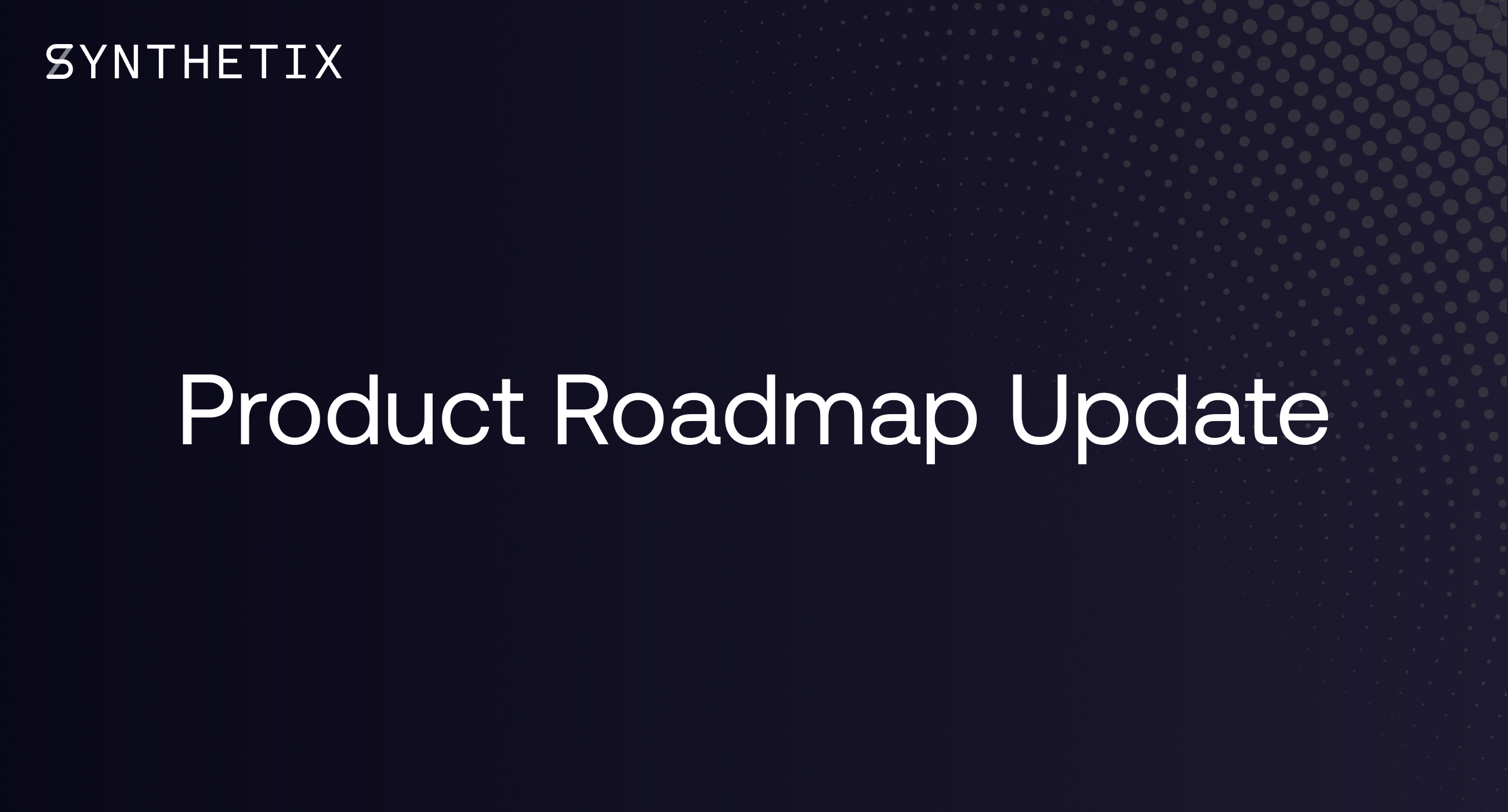Product Roadmap Update
An update on all the exciting new product developments coming up!

Preparing to scale
It is no secret that over the last year Synthetix has been focussed on building and securing the architecture of the protocol. There have been product improvements; such as the launch of sX v2, new crypto Synths and crypto index tokens but the vast majority of the effort has been aimed at securing the protocol so it was ready to scale. With the recent successful launch of Fee Reclamation and the upcoming release of continuous staking rewards we are now confident the system is robust enough to support tens of millions of dollars in daily volume. Our efforts can now transition to attracting this volume. This post will provide a detailed breakdown on the upcoming product releases for Synthetix.Exchange (sX) that we believe will drive the next growth phase of the project.
Many SNX stakers have asked when we will market the exchange. The answer has been when we feel we have reached a point where a new user will have a positive experience and will want to continue to trade on the exchange. Until then driving new users to the platform is not only inefficient but is actually detrimental to adoption because any user who has a poor trading experience will be unlikely to come back when the experience improves. We are at the point where the trading experience on sX is differentiated enough that early adopters will be excited to use it, from there we can improve and grow the user base over the rest of 2020.
Below is the list of upcoming feature releases, a detailed overview of each can be found later in the post:
- Traditional asset classes - Equities, ETFs, Indices and more
- New crypto synths
- Leveraged Synths
- Binary options
- Advanced order types
- Trading incentives
- sX interface enhancements
- Optimistic Rollups
- Synthetic futures
- Ether/DAI/BTC collateral
- Trading delegation
- Mobile interfaces
- Differential fees
The work required to support each of the above features is listed below:
- Asset listing framework with continuous risk monitoring
- ProtocolDAO expansion
- Market closure handling (for traditional assets)
- Price change circuit breakers
- Chainlink migration
When we imagine sX with all of these features it’s hard not to be incredibly excited. There is little question sX will be one of the most compelling trading venues in the world once finalised. Yet even a subset of the features above will far exceed the functionality of centralised exchanges that dominate today. There are still challenges to be sure, but we are about to enter into a new chapter in the project, all of the effort and lessons learned since we launched the first contracts in early 2018 will now pay off as we rapidly siphon off users from legacy exchanges. DeFi is coming and the momentum is unstoppable. Decentralised trading is finally putting fear into centralised exchanges in 2020!
Traditional asset classes - Equities, ETFs, Indices and more
Timeline: Q2, 2020
Dependencies: Asset listing framework, ProtocolDAO, Market closure handling & Chainlink Oracles
One of the most powerful aspects of Synthetix.Exchange is the ability to support any asset class with a secure price feed. The Chainlink migration will unlock a huge number of new assets all accessible on a single exchange. Being able to trade from an ETF to Gold and then into an inverse crypto index product with a few clicks will provide an unparalleled user experience.
New crypto synths
Timeline: Q1, 2020
Dependencies: Asset listing framework
The completion of our new asset listing framework will allow us to add a number of additional crypto assets to the platform. This will be one of the fastest ways to capture additional trading volume.
Leveraged Synths
Timeline: Q2, 2020
Dependencies: Market closure handling
Leveraged trading drives a significant amount of volume on crypto exchanges, and while synthetic futures will compete directly with centralised futures platforms, there is a lot of value in supporting tokenised leverage. We will initially test leveraged tokens using fiat currencies like the Euro and AUD. We expect to support 5x and 10x BTC tokens both long and short soon after we launch fiat leverage tokens. Following the rollout of BTC we will expand the offering to other large cap crypto tokens.
Binary Options
Timeline: Q3, 2020
Dependencies: Chainlink Oracles, ProtocolDAO
Binary options are a simple trading instrument for hedging. Synthetic binary options will likely generate significant trading volume as they will be able to leverage the liquidity of the debt pool, allowing a trader to take a large position almost immediately without needing to find a counterparty.
Advanced Order Types
Timeline: Q2, 2020
Dependencies: None
The current version of sX supports only market orders which limits the usability of the exchange. We are working with an external team to build an advanced order engine that will support limit, stop loss, stop limits and other advanced order types. This will use a relay network for processing advanced orders. Advanced order types are critical to reaching feature parity with centralised exchanges.
Trading incentives
Timeline: Q2, 2020
Dependencies: None
One of the key mechanisms we expect to drive new user growth will be trading incentives. These incentives will take the form of SNX inflation diverted to a weekly pool and allocated pro-rata to traders based on their trading volume. This will provide a strong incentive for new users to learn how to use the exchange and discover the benefits of trading on sX.
Synthetix.Exchange interface enhancements
Timeline: Q1, 2020
Dependencies: None
There are two additional components being designed for sX, the markets and the assets page. These two components will make navigating the exchange much simpler and provide significantly improved information for traders on their open positions, trading history and trading performance. In addition to these major components a number of minor enhancements will be rolled out over the coming months.
Optimistic Rollups
Timeline: Q3, 2020
Dependencies: None
We are getting closer to a demo of ORU with the Optimism team. This demo will illustrate the benefits of running Synthetix on ORU. Based on the feedback from this demo we may look to roll out a version of Synthetix that runs entirely on ORU later in the year.
Synthetic futures
Timeline: Q3, 2020
Dependencies: None
We expect the vast majority of trading volume on sX will eventually come from synthetic futures, where traders can open leveraged long or short positions on any supported asset. Synthetic futures trading will be much more flexible and will support any asset on sX. This opens up the possibility for leveraged trading on many different asset classes simultaneously, including cryptoassets, equities, and commodities. We expect leverage will initially be capped at 10-20x, however one of the advantages of synthetic futures over perpetual BTC futures found on other platforms is that a position being liquidated will not require liquidation of the underlying asset, this eliminates the need for margin calls as the trader is not posting collateral directly enabling far higher leverage than currently supported on most platforms.
Ether/DAI/BTC collateral
Timeline: Q2, 2020
Dependencies: None
The first phase of Ether collateral has been live for several weeks and uptake has been positive despite the fact that the current mechanism is not optimal for traders. The next phase will be a significant improvement as traders will be able to borrow sUSD against ETH enabling them to trade using USD as their quote currency instead of ETH. Once this upgrade has been launched we will be in a position to launch DAI/BTC collateral.
Trading delegation
Timeline: Q1, 2020
Dependencies: None
Trading delegation is scheduled for Hadar, this will be a major UX improvement enabling mobile trading interfaces without compromising security of assets.
Mobile interfaces
Timeline: Q2, 2020
Dependencies: None
While we expect that the majority of trading will occur on desktop for the near future the addition of delegation means that a user can set up a mobile wallet and update orders from their phone without risking their assets with an insecure key stored on their phone. This also creates the possibility for new interfaces to be built by 3rd party teams as well as integrations into other interfaces like crypto wallets.
Differential fees
Timeline: Q2, 2020
Dependencies: None
Now that Fee Reclamation has significantly reduced the impact of frontrunning we are in a position to relook at the fees on the exchange. One suggestion that has come up frequently has been to charge different fees for different assets classes, previously the fees were a key measure in preventing frontrunning so this was not possible. Charging lower fees for forex trading is important for attracting a wider range of traders.
Conclusion
We'll be publishing more information on the blog about many of these items in the upcoming weeks and months, explaining them in more detail. Stay tuned for more exciting updates, and in the meantime come join the conversation in Discord.

